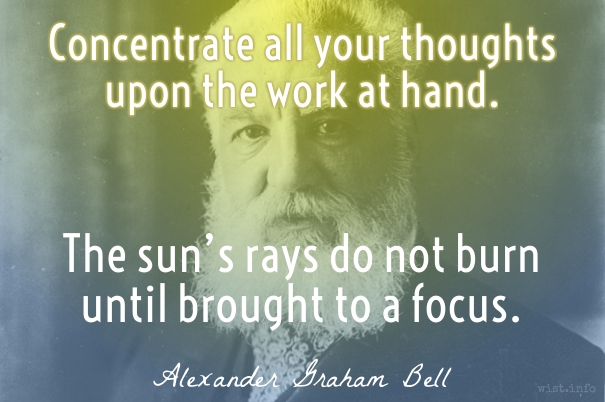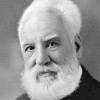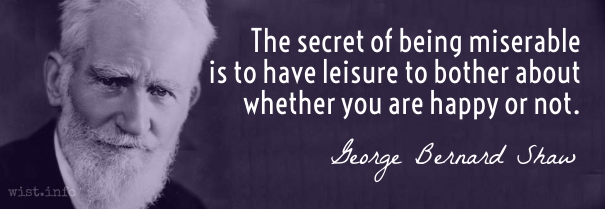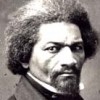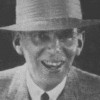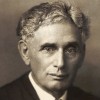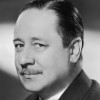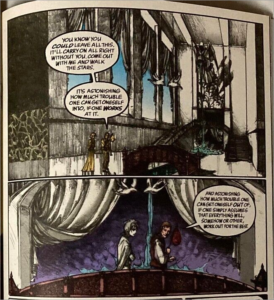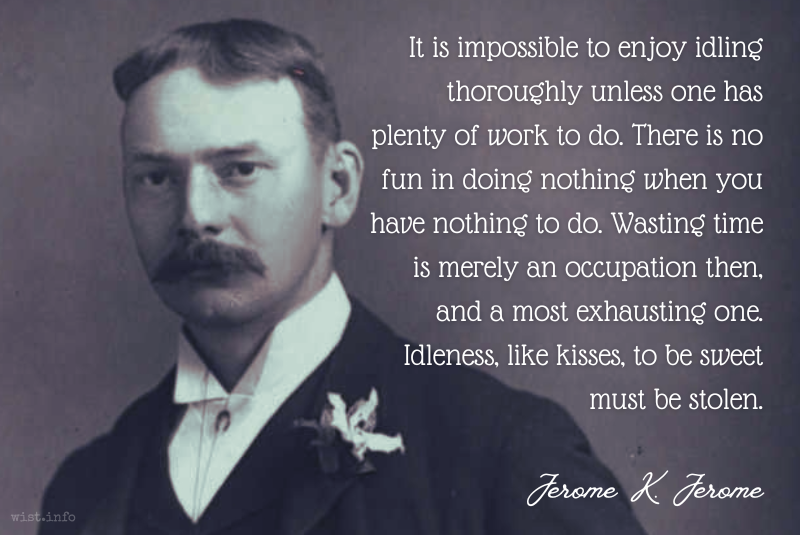It is not yours to finish the task, but neither are you free to set it aside.
Tarfon (fl. 1st-2nd C AD) Jewish rabbi, sage
Mishnah, Pirkei Avot 2:15-16
Alt. trans.:
- It is not incumbent upon you to finish the task, but neither are you free to absolve yourself from it.
- It is not up to you to finish the task, but you are not free to avoid it.
- We need not finish the task but neither can we desist from it.
- Although I am not free to avoid doing the work, it is not always necessary that I finish the task.
- You are not obligated to complete the work, but neither are you free to abandon it.
Quotations about:
work
Note not all quotations have been tagged, so Search may find additional quotes on this topic.
Laborare est orare. By the Puritan moralist the ancient maxim is repeated with a new and intenser significance. The labor which he idealizes is not simply a requirement imposed by nature, or a punishment for the sin of Adam. It is itself a kind of ascetic discipline, more rigorous than that demanded of any order of mendicants — a discipline imposed by the will of God, and to be undergone, not in solitude, but in the punctual discharge of secular duties. It is not merely an economic means, to be laid aside when physical needs have been satisfied. It is a spiritual end, for in it alone can the soul find health, and it must be continued as an ethical duty long after it has ceased to be a material necessity.
R. H. Tawney (1880-1962) English writer, economist, historian, social critic [Richard Henry Tawney]
Religion and the Rise of Capitalism, ch. 4 (1926)
(Source)
The Latin means, "To work is to pray."
There are obviously two educations. One should teach us how to make a living and the other how to live.
John Adams (1735-1826) American lawyer, Founding Father, statesman, US President (1797-1801)
(Misattributed)
Actually American writer and historian James Truslow Adams (1878-1949). Variants:
- "There are two types of education. One should teach us how to make a living, and the other how to live."
- "There are two educations. One should teach us how to make a living and the other how to live."
The virtues, like the body, become strong more by labor than by nourishment.
Concentrate all your thoughts upon the work at hand. The sun’s rays do not burn until brought to a focus.
Alexander Graham Bell (1847-1922) Scottish-American scientist, inventor, engineer
Interview, in Orison Swett Marden, How They Succeeded, ch. 2 (1901)
(Source)
[T]he behaviour of the cat was somewhat peculiar. It was soon noticed that when there was work to be done the cat could never be found. She would vanish for hours on end, and then reappear at meal-times, or in the evening after work was over, as though nothing had happened. But she always made such excellent excuses, and purred so affectionately, that it was impossible not to believe in her good intentions.
George Orwell (1903-1950) English writer [pseud. of Eric Arthur Blair]
Animal Farm, ch. 3 (1945)
(Source)
I have said time and again there is no place on this earth to which I would not travel, there is no chore I would not undertake if I had any faintest hope that, by so doing, I would promote the general cause of world peace.
The way’s not easy where the prize is great:
I hope no virtues, where I smell no sweat.Francis Quarles (1592-1644) English poet
Emblems, Emblem 11, Epigram (1634)
(Source)
Often given, "I see no virtue where I smell no sweat."
You don’t become great by trying to be great. You become great by wanting to do something, then doing it so hard that you become great in the process.
Randall Munroe (b. 1984) American webcomic writer, roboticist, programmer
XKCD, # 896 “Marie Curie” (9 May 2011)
(Source)
And now let us believe in a long year that is given to us, new, untouched, full of things that have never been, full of work that has never been done, full of tasks, claims, and demands; and let us see that we learn to take it without letting fall too much of what it has to bestow upon those who demand of it necessary, serious, and great things.
Rainer Maria Rilke (1875-1963) German poet
Letter to Clara Rilke (1 Jan 1907)
(Source)
Usually paraphrased: "And now we welcome the new year. Full of things that have never been."
Let the Care of one’s business be committed but to one Person; for otherwise, besides Disagreement which may arise when Account is taken, everyone’s Answer is, That he thought others had done it.
Thomas Fuller (1654-1734) English physician, preacher, aphorist, writer
Introductio ad Prudentiam, #1073 (1725)
(Source)
Men might not get all they work for in this world, but they must certainly work for all they get. If we ever get free from the oppressions and wrongs heaped upon us, we must pay for their removal. We must do this by labor, by suffering, by sacrifice, and if needs be, by our lives and the lives of others.
Business and pleasure, rightly understood, mutually assist each other, instead of being enemies, as silly or dull people often think them. No man tastes pleasures truly who does not earn them by previous business; and few people do business well who do nothing else.
Lord Chesterfield (1694-1773) English statesman, wit [Philip Dormer Stanhope]
Letter to his son, #189 (7 Aug 1749)
(Source)
Thank goodness, many years ago, I had a preceptor, for whom my admiration has never died, and he had a favorite saying, one that I trust I try to live by. It was: always take your job seriously, never yourself.
Be nice to people on your way up because you’ll meet them on your way down.
Approach the easy as though it were difficult, and the difficult as though it were easy; the first, lest overconfidence make you careless, and the second, lest faint-heartedness make you afraid.
[Lo fácil se ha de emprender como dificultoso, y lo dificultoso como fácil. Allí porque la confianza no descuide, aquí porque la desconfianza no desmaye.]
Baltasar Gracián y Morales (1601-1658) Spanish Jesuit priest, writer, philosopher
The Art of Worldly Wisdom [Oráculo Manual y Arte de Prudencia], § 204 (1647) [tr. Fischer (1937)]
(Source)
(Source (Spanish)). Alternate translations:
What is easie ought to be set about, as if it were difficult; and what is difficult as if it were easie. The one for fear of slackening through too much confidence; and the other for fear of losing courage through too much apprehensiveness.
[Flesher ed. (1685)]
Attempt easy tasks as if they were difficult, and difficult as if they were easy. In the one case that confidence may not fall asleep, in the other that it may not be dismayed.
[tr. Jacobs (1892)]
Undertake the easy as though it were difficult, and the difficult as though it were easy, so as not to grow overconfident or discouraged.
[tr. Maurer (1992)]
How little a thing can make us happy when we feel that we have earned it.
Why do men delight in work? Fundamentally, I suppose, because there is a sense of relief and pleasure in getting something done — a kind of satisfaction not unlike that which a hen enjoys on laying an egg.
H. L. Mencken (1880-1956) American writer and journalist [Henry Lewis Mencken]
Minority Report: H.L. Mencken’s Notebooks, #34 (1956)
(Source)
There is always some kid who may be seeing me for the first or last time. I owe him my best.
It took me twenty years to become an overnight success.
Eddie Cantor (1892-1964) American comedian, dancer, singer, actor, songwriter [b. Isidore Itzkowitz]
(Attributed)
Though most often attributed to Cantor, the phrase is also associated with Danny Thomas and many others. Sometimes given as "It takes twenty years to become an overnight success" (or sometimes ten years). More here.
There are but two ways of rising in the world: either by your own industry or by the folly of others.
[Il n’y a au monde que deux manières de s’élever, ou par sa propre industrie, ou par l’imbécillité des autres.]
Jean de La Bruyère (1645-1696) French essayist, moralist
The Characters [Les Caractères], ch. 6 “Of Gifts of Fortune [Des Biens de Fortune],” § 52 (6.52) (1688) [tr. Van Laun (1885)]
(Source)
(Source (French)). Alternate translations:
There is but two ways of rising in the World, by your own Industry, and another's Weakness.
[Bullord ed. (1696)]
There are only two ways of rising in the World, by your own Industry, or by the Weakness of others.
[Curll ed. (1713)]
There are but two ways of rising in the World, by your own Industry, or the Weakness of others.
[Browne ed. (1752)]
There are only two ways of getting on in the world: either by one's own cunning efforts, or by other people's foolishness.
[tr. Stewart (1970)]
Undoubtedly “a full dinner pail” is a great achievement as compared with an empty one, but no people ever did or can attain a worthy civilization by the satisfaction merely of material needs, however high these needs are raised. The American standard of living demands not only a high minimum wage, but a high minimum of leisure, because we must meet also needs other than material ones.
Louis Brandeis (1856-1941) American lawyer, activist, Supreme Court Justice (1916-39)
“Hours of Labor,” speech, Civic Federation of New England (11 Jan 1906)
(Source)
Reprinted in his Business -- A Profession (1914).
When a man feels that he cannot leave his work, it is a sure sign of an impending collapse. … When men are so tired, they cannot be trusted in their business judgment and cannot properly tend to their affairs.
Louis Brandeis (1856-1941) American lawyer, activist, Supreme Court Justice (1916-39)
Letter to Alfred Brandeis (8 Mar 1897)
(Source)
Write. No amount of self-inflicted misery, altered states, black pullovers or being publicly obnoxious will ever add up to your being a writer. Writers write. On you go.
Alison Louise "A. L." Kennedy (b. 1965) Scottish writer and comedian
In “Ten Rules for Writing Fiction,” The Guardian (20 Feb 2010)
(Source)
Three very crowded hours went past. They involved quite a lot of phone calls, telexes, and faxes. Twenty-seven people were got out of bed in quick succession and they got another fifty-three out of bed, because if there is one thing a man wants to know when he’s woken up in a panic at 4:00 A.M., it’s that he’s not alone.
Terry Pratchett (1948-2015) English author
Good Omens, 4. “Thursday” (1990) [with Neil Gaiman]
(Source)
There is a popular hallucination that makes of authors a romantic people who are entirely dependent upon moods and moments of inspiration for the power to labor in their peculiar way. Authors are supposed to write when they “feel like it,” and at no other time. Visions of Byron with a gin-bottle at his side, and a beautiful woman hanging over his shoulder, dashing off a dozen stanzas of Childe Harold at a sitting, flit through the brains of sentimental youth. We hear of women who are seized suddenly by an idea, as if it were a colic, or a flea, often at midnight, and are obliged to rise and dispose of it in some way. We are told of very delicate girls who carry pencils and cards with them, to take the names and address of such angels as may visit them in out-of-the-way places. We read of poets who go on long sprees, and after recovery retire to their rooms and work night and day, eating not and sleeping little, and in some miraculous way producing wonderful literary creations. The mind of a literary man is supposed to be like a shallow summer brook, that turns a mill. There is no water except when it rains, and the weather being very fickle, it is never known when there will be water. Sometimes, however, there comes a freshet, and then the mill runs night and day, until the water subsides, and another dry time comes on.
Now, while I am aware, as every writer must be, that the brain works very much better at some times than it does at others, I can declare without reservation, that no man who depends upon moods for the power to write can possibly accomplish much. I know men who rely upon their moods, alike for the disposition and the ability to write, but they are, without exception, lazy and inefficient men. They never have accomplished much, and they never will accomplish much.
J. G. Holland (1819-1881) American novelist, poet, editor [Josiah Gilbert Holland; pseud. Timothy Titcomb]
Lessons in Life, Lesson 1 “Moods and Frames of Mind” (1861) [as Timothy Titcomb]
(Source)
I tell you all this because it’s worth recognizing that there is no such thing as an overnight success. You will do well to cultivate the resources in yourself that bring you happiness outside of success or failure. The truth is, most of us discover where we are headed when we arrive. At that time, we turn around and say, yes, this is obviously where I was going all along. It’s a good idea to try to enjoy the scenery on the detours, because you’ll probably take a few.
Bill Watterson (b. 1958) American cartoonist
Commencement Address, Kenyon College (20 May 1990)
(Source)
The work is an absolute necessity for me. I can’t put it off, I don’t care for anything but the work; that is to say, the pleasure in something else ceases at once and I become melancholy when I can’t go on with my work. Then I feel like a weaver who sees that his threads are tangled, and the pattern he had on the loom is gone to hell, and all his thought and exertion is lost.
Vincent van Gogh (1853-1890) Dutch painter
Letter to Theo Van Gogh (3 Jun 1883)
(Source)
Quoted in A. Lubin, Stranger on the Earth : A Psychological Biography of Vincent Van Gogh (1996). Alternate transalations:
For me, the work is an absolute necessity. I cannot put it off; I don't care for anything else; that is to say, the pleasure in something else ceases at once, and I become melancholy when I cannot go on with my work. I feel then as the weaver does when he sees that his threads have got tangled, the pattern he had on the loom has gone to the deuce, and his exertion and deliberation are lost.
[In I. & J. Stone, ed., Dear Theo: the Autobiography of Vincent Van Gogh (1995)]
For me work is an absolute necessity, indeed I can’t really drag it out, I take no more pleasure in anything than in work, that’s to say, pleasure in other things stops immediately and I become melancholy if I can’t get on with the work. Then I feel like a weaver when he sees his threads getting tangled and the pattern that he had on the loom going to the devil and his thought and effort coming to nothing.
[tr. VanGoghLetters.org]
Your work is going to fill a large part of your life, and the only way to be truly satisfied is to do what you believe is great work. And the only way to do great work is to love what you do. If you haven’t found it yet, keep looking. Don’t settle. As with all matters of the heart, you’ll know when you find it. And, like any great relationship, it just gets better and better as the years roll on. So keep looking. Don’t settle.
Steve Jobs (1955-2011) American computer inventor, entrepreneur
Commencement Address, Stanford University (2005)
(Source)
It iz a darned sight eazier tew find six men who kan tell exactly how a thing ought tew be did than tew find one who will do it.
[It is a darned sight easier to find six men who can tell exactly how a thing ought to be done than to find one who will do it.]
Josh Billings (1818-1885) American humorist, aphorist [pseud. of Henry Wheeler Shaw]
Everybody’s Friend, Or; Josh Billing’s Encyclopedia and Proverbial Philosophy of Wit and Humor, “Puddin and Milk” (1874)
(Source)
The secret of my incredible energy and efficiency in getting work done is a simple one. I have based it very deliberately on a well-known psychological principle and have refined it so that it is now almost too refined. I shall have to begin coarsening it up again pretty soon. The psychological principle is this: anyone can do any amount of work, provided it isn’t the work he is supposed to be doing at that moment.
If you work for a man, in heaven’s name work for him! If he pays you wages that supply you your bread and butter, work for him — speak well of him, think well of him, stand by him and stand by the institution he represents. I think if I worked for a man I would work for him. I would not work for him a part of the time, and the rest of the time work against him. I would give an undivided service or none.
If put to the pinch, an ounce of loyalty is worth a pound of cleverness.
Many hands make light warke.
John Heywood (1497?-1580?) English playwright and epigrammist
Proverbes, Part 2, ch. 5 (1546)
(Source)
I would say to the House, as I said to those who have joined this Government: “I have nothing to offer but blood, toil, tears and sweat.” We have before us an ordeal of the most grievous kind. We have before us many, many long months of struggle and of suffering. You ask, what is our policy? I can say: It is to wage war, by sea, land and air, with all our might and with all the strength that God can give us; to wage war against a monstrous tyranny, never surpassed in the dark, lamentable catalogue of human crime. That is our policy. You ask, what is our aim? I can answer in one word: It is victory, victory at all costs, victory in spite of all terror, victory, however long and hard the road may be; for without victory, there is no survival.
Winston Churchill (1874-1965) British statesman and author
Speech, House of Commons (13 May 1940)
(Source)
Churchill's first speech in the House after becoming prime minister. Often paraphrased, "I have nothing to offer but blood, sweat and tears..." Audio records of the speech omit the "It is" in the beginning of the "Victory" section.
DESTRUCTION: It’s astonishing how much trouble one can get oneself into, if one works at it. And astonishing how much trouble one can get oneself out of, if one simply assumes that everything will, somehow or other, work out for the best.
Neil Gaiman (b. 1960) British author, screenwriter, fabulist
Sandman, Book 10. The Wake, # 72 “Chapter 3, In Which We Wake” (1995-11)
(Source)
He that will have the Kernel, must crack the Shell.
Thomas Fuller (1654-1734) English physician, preacher, aphorist, writer
Gnomologia: Adages and Proverbs, #2348 (1732)
(Source)
It is impossible to enjoy idling thoroughly unless one has plenty of work to do. There is no fun in doing nothing when you have nothing to do. Wasting time is merely an occupation then, and a most exhausting one. Idleness, like kisses, to be sweet must be stolen.
Jerome K. Jerome (1859-1927) English writer, humorist [Jerome Klapka Jerome]
“On Being Idle,” Idle Thoughts of an Idle Fellow (1886)
(Source)
Perpetual devotion to what a man calls his business, is only to be sustained by perpetual neglect of many other things.
Robert Louis Stevenson (1850-1894) Scottish essayist, novelist, poet
“An Apology for Idlers” (1881)
(Source)
He had discovered a great law of human action, without knowing it — namely, that in order to make a man or a boy covet a thing, it is only necessary to make the thing difficult to attain. If he had been a great and wise philosopher, like the writer of this book, he would now have comprehended that Work consists of whatever a body is obliged to do, and that Play consists of whatever a body is not obliged to do. And this would help him to understand why constructing artificial flowers or performing on a tread-mill is work, while rolling ten-pins or climbing Mont Blanc is only amusement.
We will have to repent in this generation not merely for the vitriolic words and actions of the bad people, but for the appalling silence of the good people. We must come to see that human progress never rolls in on wheels of inevitability. It comes through the tireless efforts and persistent work of men willing to be co-workers with God, and without this hard work time itself becomes an ally of the forces of social stagnation. We must use time creatively, and forever realize that the time is always ripe to do right.
Martin Luther King, Jr. (1929-1968) American clergyman, civil rights leader, social activist, preacher
Letter from Birmingham Jail (16 Apr 1963)
(Source)
Those who expect to reap the blessings of freedom, must, like men, undergo the fatigues of supporting it.
Thomas Paine (1737-1809) American political philosopher and writer
“The American Crisis” #4 (12 Sep 1777)
(Source)
The gods help them that help themselves.
Aesop (620?-560? BC) Legendary Greek storyteller
Fables [Aesopica], “Hercules and the Wagoner” (6th C BC)
(Source)
Alternate translation: "Heaven only aided those who endeavoured to help themselves. It is in vain to expect our prayers to be heard, if we do not strive as well as pray." [tr. James (1848)]
All gardeners live in beautiful places because they make them so.
Joseph Joubert (1754-1824) French moralist, philosopher, essayist, poet
Pensées [Thoughts], 1806 [tr. Auster (1983)]
(Source)
I have been unable to find an analog in other translations, or in the original French.
One of the symptoms of an approaching nervous breakdown is the belief that one’s work is terribly important.
Bertrand Russell (1872-1970) English mathematician and philosopher
The Conquest of Happiness, ch. 5 (1930)
(Source)
ANTONY: To business that we love we rise betime
And go to ’t with delight.William Shakespeare (1564-1616) English dramatist and poet
Antony and Cleopatra, Act 4, sc. 4, l. 27ff (4.4.27-28) (1607)
(Source)








